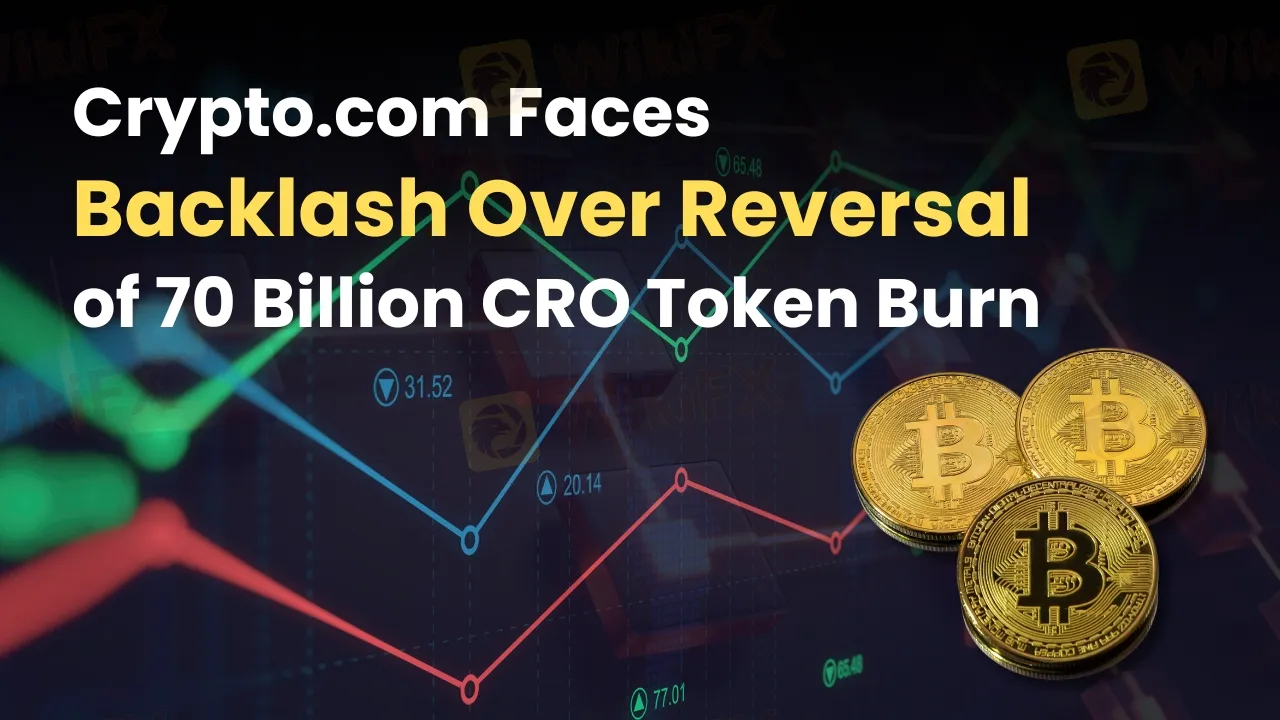简体中文
繁體中文
English
Pусский
日本語
ภาษาไทย
Tiếng Việt
Bahasa Indonesia
Español
हिन्दी
Filippiiniläinen
Français
Deutsch
Português
Türkçe
한국어
العربية
Crypto.com Faces Backlash Over Reversal of 70 Billion CRO Token Burn
Abstract:Crypto.com’s controversial decision to re-issue 70 billion CRO tokens sparks outrage, raising concerns about vote manipulation and decentralization.

Crypto.com finds itself in hot water as a divisive vote has undone a massive 70 billion CRO token burn on its Cronos blockchain, leaving the crypto community reeling. What was once celebrated as a bold step toward decentralization in 2021 has now morphed into a lightning rod for criticism, with accusations of vote manipulation swirling around the company.
The saga began when Crypto.com CEO Kris Marszalek stepped in to reassure users about the company‘s financial health amid the uproar. The decision to re-issue 70 billion CRO tokens effectively scraps a historic burn that saw 59.6 billion tokens torched instantly in 2021, dubbed “the largest token burn in history.” That move was meant to slash supply and bolster the network’s value ahead of the CRO mainnet launch. The remaining tokens were earmarked for rewards and growth—until now.

On March 2, Crypto.com unveiled its Cronos Strategic Reserve proposal, a $5 billion plan at CRO‘s current $0.08 price tag. The re-issued tokens will land in an escrow wallet, pushing the total supply back to 100 billion CRO. The goal? To fuel U.S. crypto dominance, ecosystem expansion, and even a CRO exchange-traded fund (ETF). But the community isn’t buying it. Many argue the company couldve used its profits to repurchase tokens from the market, rewarding loyal supporters instead of flooding the supply.
The 2021 burn had been a triumph, catapulting CRO‘s price from $0.06 to $0.25 as scarcity kicked in. Now, reversing it feels like a gut punch to those who believed in the vision. Critics say it dilutes value and erodes trust, with some pointing fingers at Crypto.com for allegedly controlling 70%–80% of the voting power. If true, the vote’s passage—despite widespread dissent—feels less like democracy and more like a done deal.
The backlash has been fierce. Social media is ablaze with users decrying the move as a betrayal of decentralization ideals. They question why a company pushing for a decentralized future would cling so tightly to centralized control. The passed vote has only deepened suspicions, with many calling it a sham masked as community input.
In response, Crypto.com has scheduled an AMA event for March 25, where the token burn fiasco will likely take center stage. Marszalek and his team will have to face the music and explain why they chose this path over one that might‘ve kept the community’s faith intact. For now, the reversal stands as a stark reminder: in crypto, trust is hard-won and easily lost.

Disclaimer:
The views in this article only represent the author's personal views, and do not constitute investment advice on this platform. This platform does not guarantee the accuracy, completeness and timeliness of the information in the article, and will not be liable for any loss caused by the use of or reliance on the information in the article.
Read more

South Korean Regulator Blocks Access to 17 Unreported Offshore VASP Apps on Google Play
South Korea’s Financial Intelligence Unit (FIU) has blocked access to 17 unreported offshore VASP apps on Google Play to protect domestic users from potential financial risks.

How Cyberattacks Cost BSP-Overseen Institutions P5.82 Billion in 2024
Cybersecurity risks cost BSP banks P5.82B in 2024. Phishing and AI-driven attacks surge as digitalization widens vulnerabilities. Explore the rising cyber threat impact.

Bank Central Asia Addresses Cryptocurrency Scam Claims
Bank Central Asia responds to a cryptocurrency scam using its accounts, targeting investors via social media. Learn about the scam and BCA’s stance.

Why Is Crypto Booming in Online Trading Compared to Forex?
Know why cryptocurrencies are booming in online trading, offering forex traders new opportunities, higher volatility, and the potential for greater returns.
WikiFX Broker
Latest News
Africa Cybercrime Bust: Over 300 Arrested in Fraud Crackdown
The Growing Threat of Fake Emails and Phishing Scams
Hong Kong Banks and Authorities Collaborate to Freeze Fraudulent Accounts Faster
SocialFi and the Forex Market: A New Era for Decentralized Social Trading?
Is Billion Bucks Fx Scam?
BaFin Halts USDe Token Issuance, Citing Serious Compliance Failures
The Rise and Risks of Forex Signal Apps: An In-Depth Analysis
Enlighten Securities Penalized $5 Million as SFC Uncovers Risk Control Failures
Why Are Financial Firms Adopting Stablecoins to Enhance Services and Stability?
Experienced Forex Traders Usually Do This Before Making a Lot of Money
Currency Calculator







